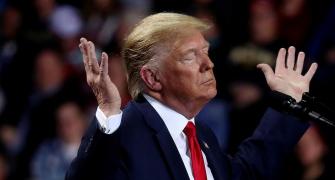The sixth Pravasi Bharatiya Diwas will begin on January 8 in New Delhi. Every year the event brings along with it a host of cribs and murmurs. Many feel Indians from the Western countries hijack the show. The people from these Western countries feel they are wanted only for investments and that the government is not ready to give them anything in return. And the people in India just can't understand what the fuss is about. Why are these NRIs pampered, they wonder.
On the eve of the sixth PBD, Union Minister for Overseas Indian Affairs Vayalar Ravi clears the air about these perceptions and explains to rediff.com's Krishnakumar how this year's event will bridge the gap between the Indians abroad and Indians back home.
What will be the focus of this year's event?
The focus this year will be social issues concerning Indians. Education and healthcare will be the major issue on one side and the empowerment of the rural women and children through microfinance will be the other.
The second will be a major initiative that will bring about a huge change in the coming years.
Now, Investment is confined to a very few people. But of the 25 million Indians living abroad, at least one million might be willing to help their fellow Indians back home. But there are too many restrictions on sending money home.
So, we are trying to establish a link between Indians abroad and their communities back home. The impact will be the appreciation of the 6,506 development blocks in the country.
We will have a single window system which will be headquartered in New Delhi and have charters in various states. I hope to start with at least 500 blocks. I will give an opportunity to people from different states to help their people back home. It is a very ambitious project.
How different will this year's event be from the previous years?
There was a misconception that this is a platform for attracting investments. This time I have changed the face of the Indian Diaspora. I want to create an opportunity for people to interact and contribute through philanthropy apart from investments.
What have you learnt from the previous events? Is there anything that you think will be better if done in a different manner?
I want this year's event to be for the ordinary Indian living abroad. In that sense, the PIO (people of India origin) university is a big thing. Fifty per cent of the seats will be reserved for people from abroad. This way, Indians from the lower strata living in other countries who might find it tough to provide good education to their children can send them here.
This will also help us instill a sense of Indian-ness among those people.
What is being done about voting rights for PIO and their dual citizenship demands?
I do not know where this sudden demand for dual citizenship is emerging from? There is no provision for that. If you are a citizen of some other country, you can't be a citizen here.
The Overseas Citizenship of India card enables overseas Indians holding foreign passports free access to the country and also gives them a lot of other benefits.
As far as voting rights for people born in India and residing abroad is concerned, the proposal is in the Parliament and it will be taken ahead from there.
There is a feeling that Indians living in Western countries are favoured more than those from other countries. What will you do to change that impression?
I do not know why people have this impression. Last time, a lot of people who were felicitated were from the Caribbean and African countries. We are very interested in the betterment of Indians living in the Gulf countries.
In fact, I have been accused of playing favourites to Indians in the Gulf since most of them are from Kerala, like me.
But take a look at the facts. Of the Rs 25 billion that comes in remittance, Rs 18 billion is from the people in the Gulf. And they are also the worse off lot when it comes to standard of living. Are they not right in expecting help from the government? Am I not supposed to help them? Of course, I will!
There is this misconception that NRI means Indians in America. I want to change that and this year's event will change that misconception.
Again, among people from Western countries the perception is that they are wanted only when it comes to investments and that they are neglected when it comes to their demands. What will you do to reverse this perceived imbalance?
Who is investing in India? I do not know. The PBD is not a platform for brining in investments. We just give an opportunity for those interested in investing by enabling them to do it. Ours is not a ministry to run after them to bring in investments. In the past 15 years, the foreign direct investment has been only five per cent of the total investments.
It is only an event for the betterment of Indians living abroad and then getting them to do something for the betterment of their fellow Indians back home.
Some say the PBD has lost its charm and is becoming diluted with each passing year.
It is not like that at all. This year, we are hoping some 1,500 people will attend the event. I can assure you at least 1,200 people will attend. Even the lower figure I gave you is higher than last year's attendance which was 1,000-1100.
So new people are coming every year. For someone looking at it from the outside, it might seem like an annual ritual that is diluted. But the truth is more youngsters and new people are participating every year. And this year, we hope to make it a grand success.







